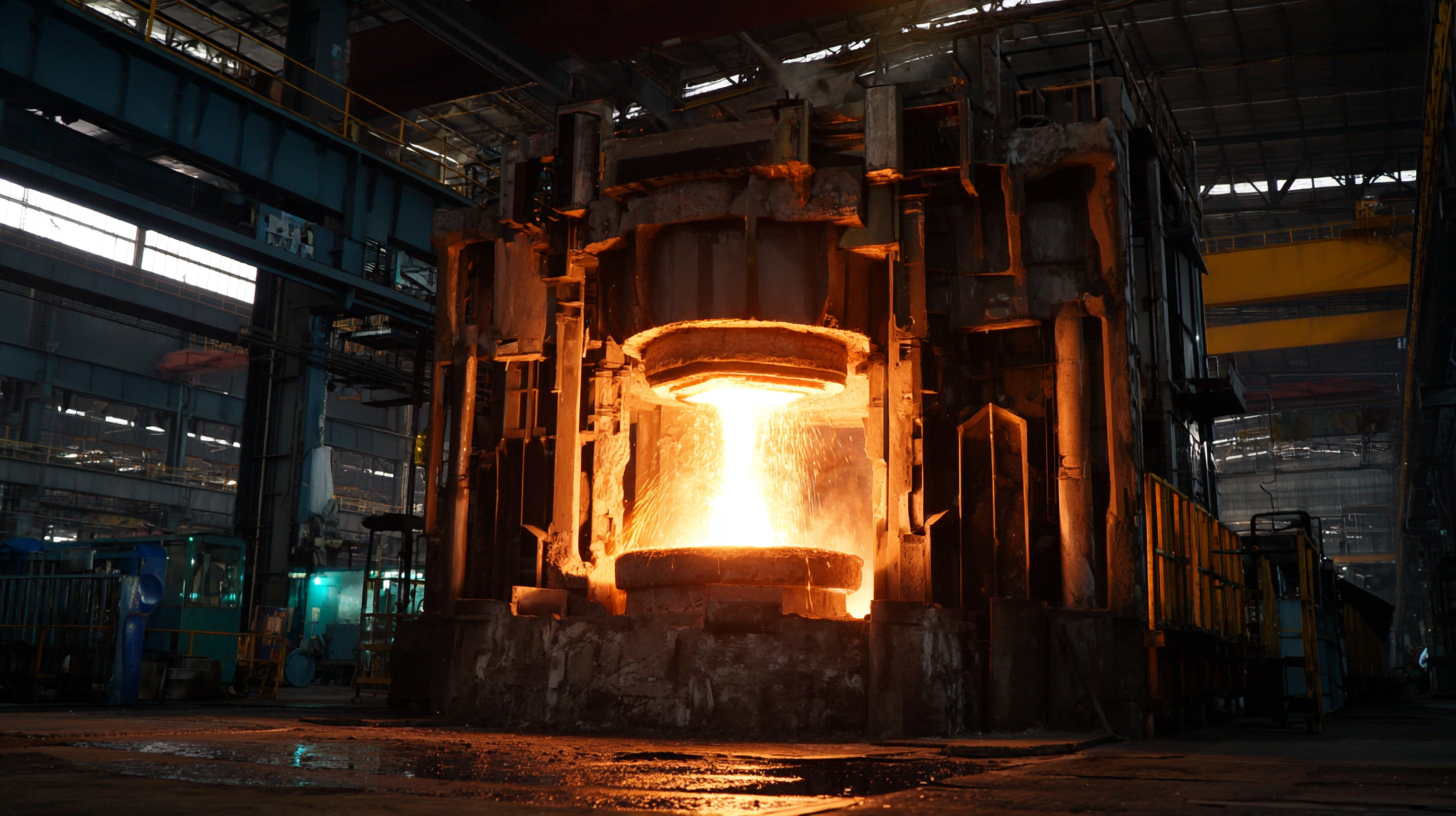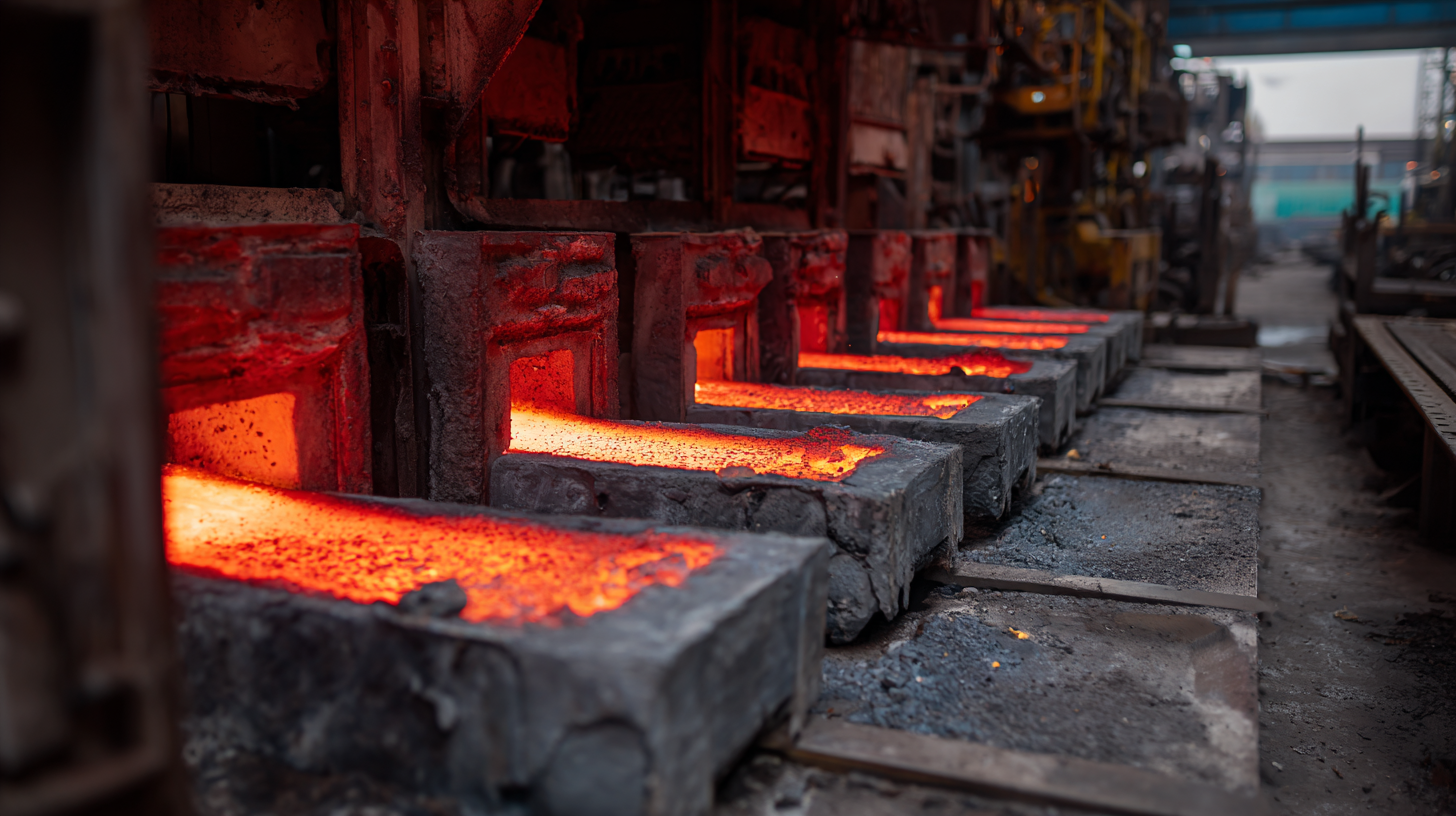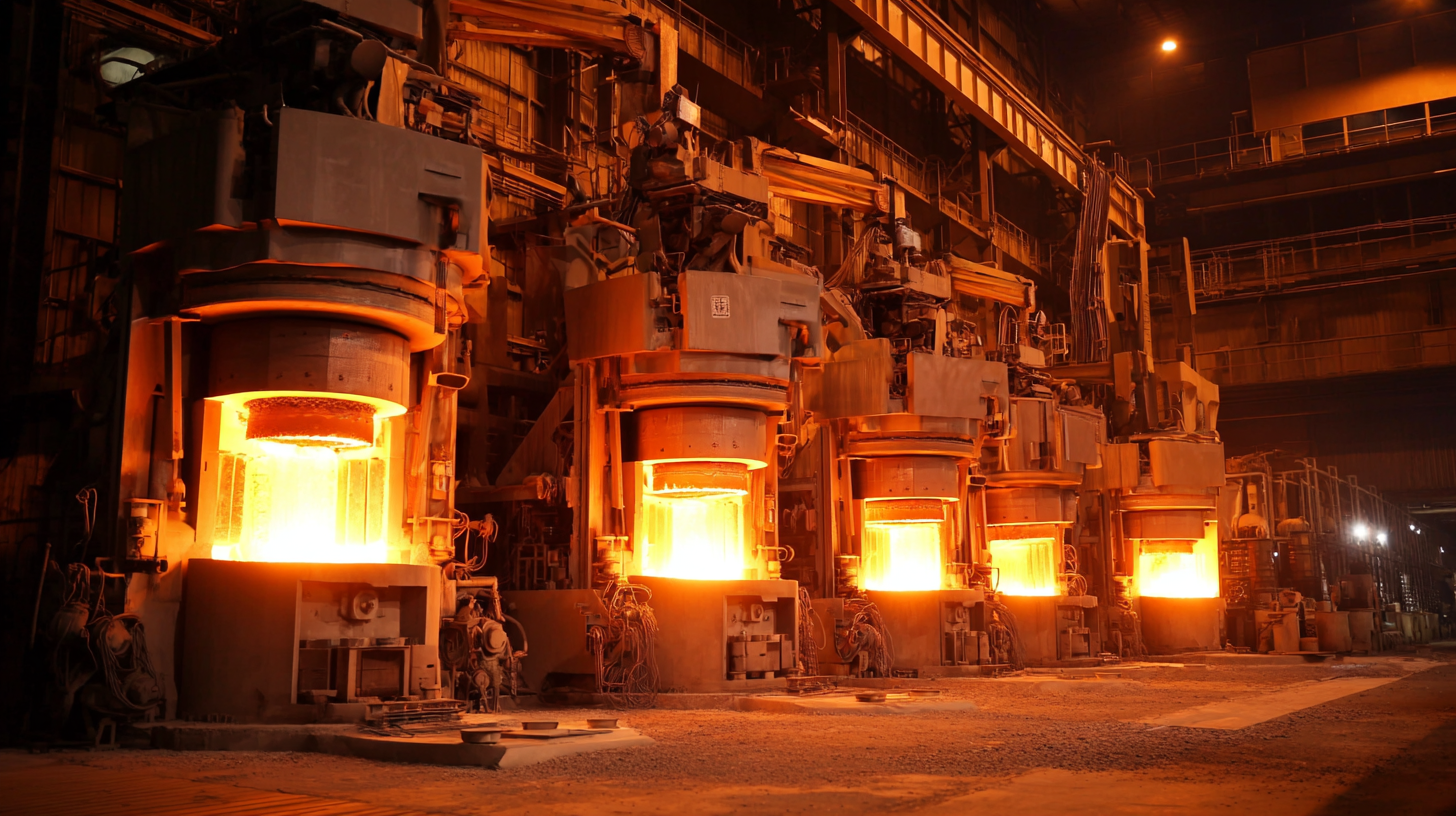
- Email Support info@futmetal.com
- Call Support +86-15726878155

These days, when it comes to modern manufacturing, you'd probably agree that having efficient and environmentally friendly processes is more important than ever. Take the Aluminum Melting Electric Furnace, for example — it’s become a pretty key player in metal fabrication. Not only does it boost productivity, but it also helps cut down on environmental impacts. I was reading a report from Grand View Research the other day, and it mentioned that the worldwide aluminum market could hit around $250 billion by 2025. A big part of that growth is thanks to electric melting methods, which are more energy-efficient and produce fewer carbon emissions. At Wenzhou Future Import & Export Co., Ltd., we really see how companies using Aluminum Melting Electric Furnaces are getting ahead — they’re not just making their operations smoother, but they’re also standing out in a market that’s getting greener and more conscious about sustainability. Plus, since we’re part of Zhejiang Rongda Energy Saving Technology Co., Ltd., we’ve got all the specialized services to help clients handle international deals and stay ahead in this ever-changing world of industrial manufacturing.

Aluminium melting electric furnaces have really become a key part of today’s manufacturing scene. They’re actually pretty critical when it comes to processing and recycling aluminium. These modern furnaces use electric heating elements to reach the super high temperatures needed to melt aluminium — and honestly, they do a great job at it. What’s really nice about them compared to old-school versions is the level of control you get. You can fine-tune the temperature exactly, which helps save energy and cuts down on waste. Plus, this kind of precision isn’t just good for saving costs — it also means the final product is of a consistently high quality, which is super important in industries that demand top standards.

If you’re in manufacturing and want to get the most out of your operation, understanding how aluminium melting electric furnaces work is a smart move. Basically, they usually have a crucible where the aluminium sits, surrounded by a heating chamber with electric coils that generate the heat. The design is pretty efficient — it makes the melting process smoother and faster, often cutting down cycle times compared to other methods. And because it’s a closed system, it helps reduce emissions, making the process a lot more eco-friendly. With more and more demand for recycled aluminium these days, electric furnaces are quickly becoming the go-to choice for foundries and metal shops aiming for better efficiency and sustainability.
You know, the shift to electric furnaces in aluminum making has really changed the game. It’s a pretty big upgrade over the old-school melting methods we used before. I came across a report from the International Aluminium Institute that says these electric ovens can hit energy efficiencies of 80% or even more. That’s a huge deal because it cuts down on costs pretty significantly and helps the environment too. In fact, using electric melting can slash greenhouse gas emissions by up to half compared to those fossil fuel-based processes. Pretty impressive, right?
And it doesn’t stop there. Electric furnaces give manufacturers way better control over the entire process. So, keeping temperatures steady and making sure the alloy’s just right becomes much easier. According to the Aluminium Stewardship Initiative, companies using electric furnaces tend to have fewer issues with product quality, which means they get a higher yield of pure aluminum. That’s a big plus—it not only boosts productivity but also improves the material’s properties, making it perfect for stuff like airplanes or cars, where performance really matters. With everyone pushing for more sustainable and efficient manufacturing, I think electric melting is definitely going to be a major player in the future of aluminum production.
You know, integrating Aluminium Melting Electric Furnaces (or AMEFs for short) into modern manufacturing really is a game-changer. Not only does it boost productivity, but it also makes the whole process way more energy-efficient and eco-friendly. These days, pretty much every industry is looking for ways to cut down their carbon footprint, and honestly, these furnaces offer a cleaner, smarter option for melting aluminum compared to the old-school methods. Since they run on electricity instead of fossil fuels, they help cut down greenhouse gases — making them a must-have in today’s manufacturing world.
If companies want to squeeze even more out of their energy use, upgrading their furnace setups with better insulation can make a big difference — it keeps the heat in where it belongs. Plus, using real-time monitoring tools can help fine-tune energy consumption, making sure everything runs as efficiently as possible. Do these small changes, and suddenly you’re talking about lowering energy bills and reducing waste. It’s pretty awesome.
And let’s not forget, being sustainable isn’t just about slashing emissions — it’s also about sourcing responsibly and managing resources wisely. One smart move is to set up a closed-loop recycling system for aluminum scrap — basically, reusing what you’ve already got. This cuts down on the need for raw materials and uses less energy to melt recycled aluminum versus new stuff. Investing in these kinds of systems not only helps the planet but also makes economic sense, pushing manufacturers closer to a genuinely greener and more sustainable future.

You know, when it comes to aluminium melting electric furnaces, temperature control isn’t just a minor detail — it’s actually a big deal. If you get it right, it can seriously impact the quality of the final product. The Aluminum Association points out that keeping the temperature just right helps cut down on oxidation and contamination, which are major when you're trying to keep aluminium pure. In real-world terms, sticking to a melting temperature between about 660 and 720 degrees Celsius helps prevent gas bubbles from forming and boosts the strength of the material. That means your manufacturing runs smoother, with less scrap to deal with.
Lately, there have been some pretty cool advances in how we control temperature—think digital controllers and fancy thermocouples. These tools let manufacturers fine-tune heat management like never before. A recent study from the International Journal of Metal Forming even says that achieving more even heat can improve the melting process by around 15%. The bonus? That ups productivity quite a bit. Plus, companies that invest in up-to-date furnace tech with integrated temperature monitoring see energy bills drop by as much as 20%, which is a win-win for both their wallets and the environment. All of this just goes to show how crucial good temperature control really is — it makes the melting process better and more reliable, and honestly, it keeps aluminium melting electric furnaces as absolute must-haves in modern manufacturing shops.
Electric furnaces have really changed the game when it comes to melting aluminum. More and more, they're becoming the go-to option instead of the old-school methods we used to rely on. When you compare the two, it’s clear that electric furnaces pack some serious benefits, especially in terms of efficiency and being eco-friendlier. For example, according to the International Aluminium Institute, these furnaces can save up to 30% of energy compared to traditional gas-powered ones. Not only does that cut down costs, but it also helps reduce carbon emissions, which is a big plus considering the industry’s push for greener processes.
If you’re thinking about making the switch, it’s worth taking a close look at your operation’s capacity and the tech that best fits your needs. Things like high-frequency induction heating systems can really speed up melting times and boost productivity — making the investment way more worthwhile over time. Just don’t forget to check if your facility can handle the electrical requirements of these new setups.
Another bonus? Electric melting gives you way better control over the temperature and melting pace. That means you end up with a higher-quality aluminum because it’s easier to keep impurities and defects at bay. A study from the American Foundry Society even shows that consistent temp control can really help improve product quality, which is super important if you're trying to meet strict standards for different applications. All in all, it’s a smart move if you’re looking to stay ahead and get the best results.
You know, these aluminium melting electric furnaces are really becoming a key part of modern manufacturing nowadays. It’s like they’re almost essential, especially as industries are on the lookout for smarter and greener solutions. I read somewhere—probably in a recent report by ResearchAndMarkets—that the entire global market for electric furnaces is expected to grow at about 6.2% annual rate until 2028. And a big driver behind that? Tech advancements in aluminium melting, for sure. It’s pretty exciting because this shift isn’t just about increased production; it’s also about making things more eco-friendly. Electric furnaces, after all, tend to pump out fewer greenhouse gases compared to the old-school methods.
What’s really cool is all the innovation happening right now. Things like induction melting and automated control systems are really changing the game for aluminium manufacturing. These technologies are making the whole process way more energy-efficient—some studies even suggest induction furnaces can hit up to 90% efficiency! Plus, with smart tech added into the mix, operators can control temperatures with more precision and even melt aluminium faster. It’s all about making production smoother and more sustainable at the same time. As we move forward, it’s obvious that aluminium melting isn’t just about keeping up with demand anymore; it’s also about doing stuff in a way that’s better for our planet and aligned with global environmental goals.
: Temperature control is crucial as it directly influences the quality of the final product, reducing oxidation and contamination, and helps maintain the purity of aluminium.
The optimal melting temperature range for aluminium is between 660–720 degrees Celsius, which minimizes the risk of gas entrapment and improves the material's mechanical properties.
Modern technologies like digital controllers and thermocouples enable finely-tuned heat management, enhancing melting processes by improving temperature uniformity and productivity.
Electric furnaces can achieve energy savings of up to 30% compared to conventional gas-fired melting methods, reducing operational costs and minimizing carbon emissions.
Electric furnaces offer enhanced control over temperature and melting rates, which leads to improved metal quality by reducing impurities and defects in the final product.
Manufacturers should assess the capacity and technology that best fit their production needs and ensure their facility can handle the specific electrical demands of electric furnaces.
Companies can achieve a reduction in energy consumption by up to 20% by investing in modern furnace systems with integrated temperature monitoring.
Improved temperature uniformity can enhance the melting process by approximately 15%, significantly boosting overall productivity in aluminium melting.
Optimizing temperature control is essential for manufacturers aiming to meet stringent quality standards in various applications, as it directly impacts the purity and overall quality of the aluminium produced.
Aluminium melting electric furnaces are pretty much essential in today’s manufacturing world. They come with a bunch of perks that really help streamline the production process. For starters, they allow for precise temperature control, which means the aluminum melts more consistently and with better quality. Plus, they’re energy-efficient, so they not only save power but also support more eco-friendly manufacturing—something we’re all paying more attention to these days.
Compared to old-school melting methods, these electric furnaces really stand out because they’re more efficient and produce fewer emissions. As technology keeps evolving, we’re probably going to see even better performance from these systems, cementing their role as a must-have in the industry. At Wenzhou Future Import & Export Co., Ltd., we get how important it is to stay ahead with the latest tech, especially to give our clients that extra edge when it comes to international trade.
